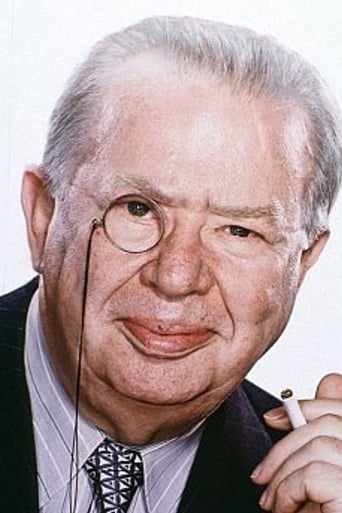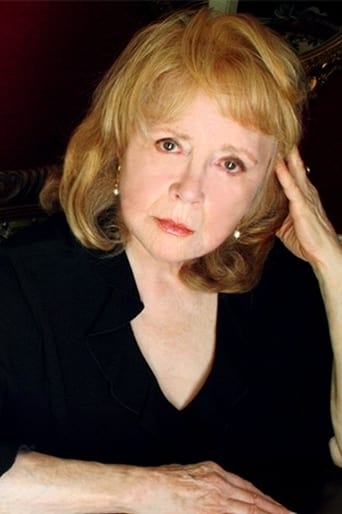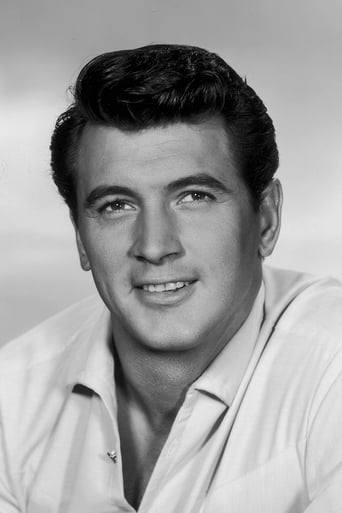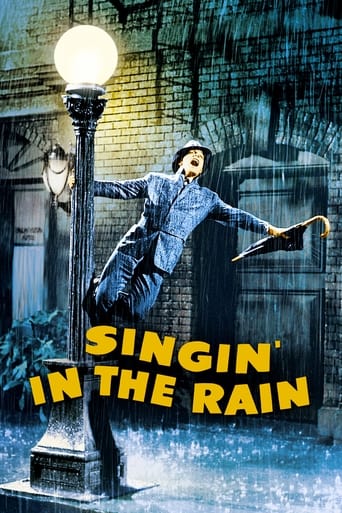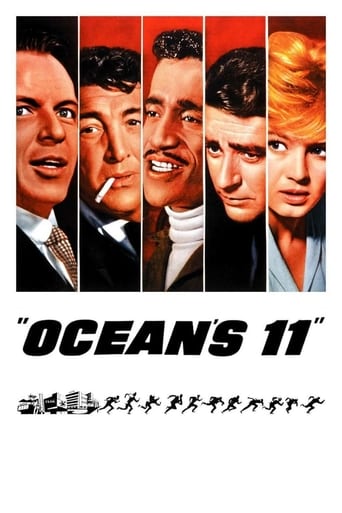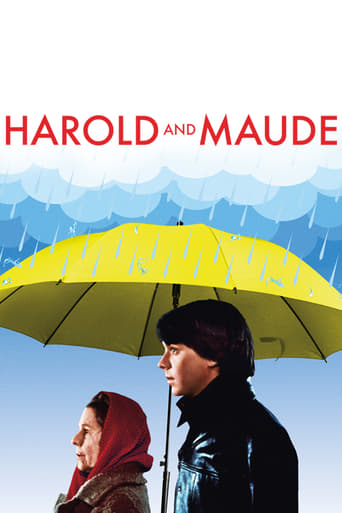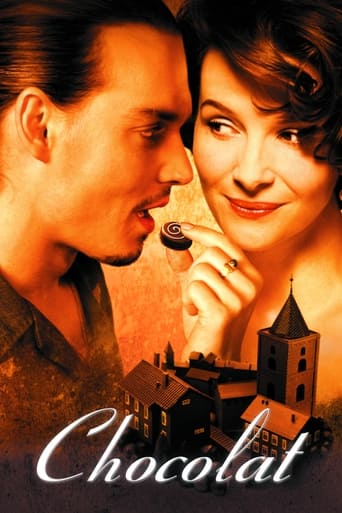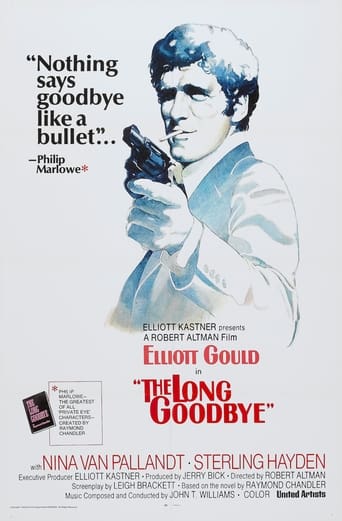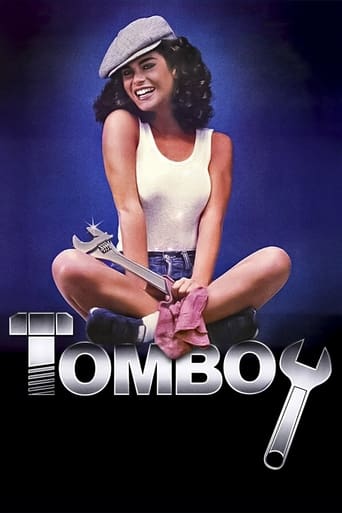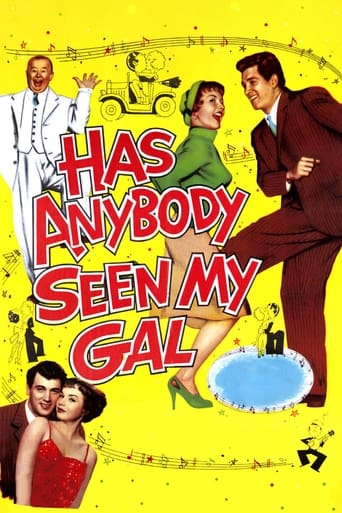
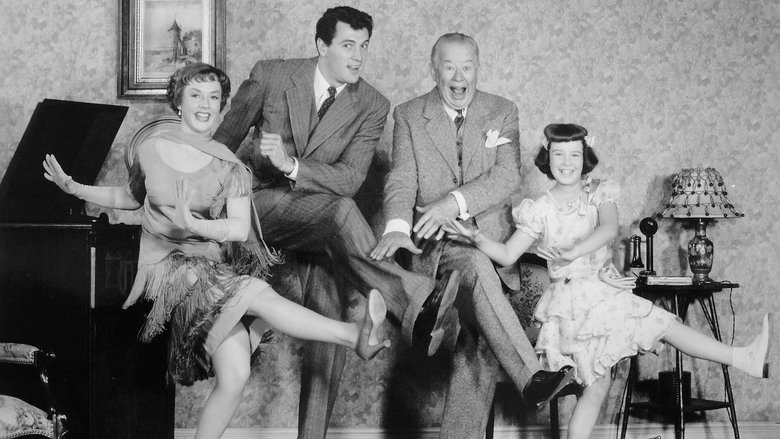
Has Anybody Seen My Gal? (1952)
When a 1920s millionaire tests the fiber of his Vermont family, a young lady and her boyfriend feel the repercussions.
Watch Trailer
Cast


Similar titles
Reviews
The most dominating character role I've seen irascible grandfatherly Charles Coburn play. This is definitely his movie, whatever the official credits suggest. He also dominated, again playing a tycoon, in "The Girl Who Took the West", where again he was concerned how his fortune would fare after he was gone. Coburn, as Samuel Fulton/alias John Smith, having no close kin, wants to bequeath his fortune, especially in gold and oil companies, to the descendants of the one woman he loved, back when he was poor and struggling. He wants to express his gratitude to her for refusing him, which stimulated him to travel around the US, looking for investment opportunities. But first, he wants to test if this family can handle his fortune responsibly. He fakes an advertisement from them for a roomer, then shows up on their doorstep with the paper in hand, badgering them into accepting him as the roomer.Mrs. Blaisdell(Lyn Bari) is characterized as the worst offender in spending the test money lavishly on a mansion with fancy furnishings, expensive car and clothes, etc.. She even demands they trade in their personable Airedale for a pair of French poodles. In large part, she wants these things in order to be accepted as an equal by the town upper crust, so that her daughter, Millie, is better qualified to marry the son of a rich family. Meanwhile, son Charles tries to multiply their fortune by gambling at cards, but instead loses all his money, necessitating Coburn to use his expertise at card gambling to win it back for him anonymously. Meanwhile Mr. Blaisdell gambles a good share of the money on a stock, which then collapses. Daughter Millie is the only one of the adults who is conservative in her demands with the money. Her mother wants her to marry a rich man she doesn't love. Now that they are rich, Millie's boyfriend Dan(Rock Hudson), a mere soda jerk, feels out of place as her boyfriend, so breaks off their engagement. But later, when the family is flat broke, he resumes his interest in Millie, while her rich fiancé suddenly loses interest in her.We don't learn whether Coburn decided to will the rest of his fortune to the family. He took a special interest in Millie. If I were him, I would have all securities, companies and cash put in a trust fund, from which they can draw so much per year. with Millie getting the most. This comedic drama is played against a background of 1920s culture, including raccoon coats and a number of songs. In fulfilling his role as a snooper and aid to the Blaisdells, Coburn is arrested several times for frequenting a speak-easy or a gambling den, and reprimanded for allegedly necking in a movie theater with Millie. He is talked into working in the Blaisdell's pharmacy as a soda jerk, after an inauspicious training period. At night, he has to sleep with the family dog.The aspect that deserves the most criticism is the excessively feel good ending, which has the family returning to their old house and old business(which they had sold),as if they had never received the money and hadn't gone bankrupt. Should Coburn have revealed himself before leaving , or disappeared incognito.Lyn Bari, usually typecast as "the other woman" or loser, has a different role here, but still clearly comes across in a negative light who, along with the others, loses their fortune because of their greed. Also, she champions "the other man" to marry her daughter.
It is hard to imagine German exile Douglas Sirk (Hans Detlef Sierck) directing anything less likely than this, for it is even more extraordinarily pure Americana than the other Rock Hudson films he directed later. The film is based on a story written by Eleanor H. Porter, author of 'Polyanna'. The first thing to say about this film is that the cinematographer Clifford Stine ruined it from the start. Most of the interior scenes are so brightly lit by 'brutes' that they seem to be taking place in the Sahara Desert at noon. Any chance that a nuance might survive such savage and searing light was nil. The amount of sweat sponged off the actors' faces by the makeup lady between takes must have been enough to fill a swimming pool. The film is notable for an early appearance in a tiny cameo role by James Dean as a teenager sitting at the soda counter in a small town drug store. Even in his few fleeting moments, Dean manages to be electric, which is astonishing and most impressive. Although this film purports to be a cozy tale of small town life, it is based upon a rather rotten premise. It concerns a rich elderly curmudgeon, brilliantly played by Charles Coburn, who decides to stay as an incognito boarder in the house of a family to which he might or might not leave a fortune, depending on what he decides that he thinks of them. They are the daughter and grandchildren of the girl he wanted to marry but who dumped him, so that he lived his life as an embittered bachelor. The film was immensely popular when it was released. The story touches the central nerve of the USA, the land where Money is worshipped on bended knee by 300 million devotees, all of whom dream every night of the supposed delights of untold riches, especially unearned riches which come from an unexpected source (hence the popularity of Las Vegas and Atlantic City). Money is the only measure of value accepted by the majority of Americans. If you have a rare book or a beautiful painting any American visitor admiring it will give you what is meant to be the highest form of praise: 'That must be worth a lot!' It is only the monetary value that matters, the contents of the book or the beauty of the painting being incidental and essentially meaningless. Hence a fairy tale of a rich old man who might leave you a fortune is the ultimate dream, the True American Dream! The situation is made worse by the fact that so many people in America are desperately poor, far more now than in 1952 of course, for at that time there was national prosperity. Therefore they all still dream of Charles Coburn, even if they have never heard of him. The cute little girl in the film is played by Gigi Perreau, aged ten at the time. It is difficult for people today to realize how popular she was as a child actress. She first appeared on screen at the age of two, and she was only three when she played the illegitimate daughter of a Belgian woman who had been raped by a German soldier in THE MASTER RACE (1944, see my review). All during the 1950s she was a favourite of all the little boys throughout America, and made their tiny hearts throb in incomprehensible ways. She was not that cute, not that pretty, not that charming, but nevertheless she was a tearaway success. Her fame was eclipsed starting in 1959 with the appearance of the young Hayley Mills in the film TIGER BAY (1959). Hayley was a law unto herself: irresistible in every conceivable way, she could be sweeter than Margaret O'Brien (and that's saying something!), cheekier and cuter than Shirley Temple had ever been, more poignant that Natalie Wood, more everything than everybody, in fact. And so Gigi Perreau was suddenly forgotten, poor thing. But she had had a good run for her money and was four years older, and besides was getting long in the tooth at the great age of 18. She had had a run of 16 years and now it was somebody else's turn. So from these comments you may gather that in retrospect I do not believe she added much to the film, though at the time everybody was entranced by her. That is what happens when you are up against Hayley Mills in hindsight! Rock Hudson plays a young 'soda jerk' romantic lead, but doesn't have many interesting lines, and it is an unrewarding part, so he just looks dull and square-jawed and slightly ill at ease. Piper Laurie as the ingénue whom Hudson wants to marry was thought in those days by everybody to be lively, pert, and quite a cutie. In retrospect, she seems dreadfully dull too. (And just to make things worse, her makeup and costumes are bad.) In fact, everybody in the film is rather dull other than Charles Coburn and James Dean. And the film is a dreadful disappointment. But the crucial fact to remember is that it was not a dreadful disappointment back then. It served its audience of Middle America perfectly according to the undemanding standards of 1952. And for those prepared to watch a bit of nostalgia wearing their sunglasses (because of the harsh lighting), this rather tepid film might warm a cockle or two.
Although Piper Laurie and Rock Hudson are the stars of Has Anybody Seen My Gal, this film belongs to Charles Coburn. He does one of those patented foxy grandpa roles that he honed to perfection in such films as The Devil And Miss Jones and The More The Merrier.Coburn plays one of the richest men in the world, Rockefeller type rich and the film opens in the Rockefeller town of Tarrytown where Coburn is one of their neighbors. He's making out a last will and testament and since he's got no family of any kind, he's decided to leave his money to the Blaidells who are the descendants of the woman he once courted, but who married someone else.But of course the Blaisdells do bear checking out so Coburn gets out of his sickbed where he's enjoying all attention he's been getting and visits them incognito. The family consists of husband and wife Larry Gates and Lynn Bari and children Piper Laurie, Gigi Perreau, and William Reynolds. Bari is the daughter of his lost love, but she's got a lot of social climbing pretensions, Coburn sees more of his former sweetheart in her granddaughter Piper Laurie. Piper's going out kind of with the soda jerk in her father's pharmacy Rock Hudson. But Skip Homeier is hanging around and he's the son of the wealthiest people in their town and that's a match Lynn Bari would prefer.Coburn gives them a test run so to speak. First he finagles his way into boarding with them under an assumed name. Then like John Beresford Tipton he bequeaths on them anonymously a check for $100,000.00. Of course it all goes to Bari's head and she drags the rest of the family somewhat reluctantly into a new lifestyle.Has Anybody Seen My Gal is set in the Roaring Twenties and the music score is of that period, popular tunes played in the background and occasionally done by the cast. Coburn has some incredibly good scenes here with Gigi Perreau, he saves Piper Laurie from being arrested in a speakeasy raid, and does a mean Charleston once he learns. Bari comes off second best in the cast as a woman who learns that even comparative wealth can bring with it all kinds of problems. Her family the Blaisdells learns in a more humorous way, the lesson George Bailey learned that no man is a failure who has friends. We can't all be millionaires.Four years away from when they shared Oscar nominations for Giant, Rock Hudson and James Dean were in the same film. Dean had some small bit parts in a few films and television work before hitting it big. This is one of those bits and you can plainly recognize him as one of the Roaring Twenties kids at the drugstore soda fountain.Has Anybody Seen My Gal did good things for stars Rock Hudson and Piper Laurie, but this film belongs to Charles Coburn and the marvelously droll and funny performance he gave.
Has Anybody Seen My Gal (Douglas Sirk, 1952) is a winning comedy from the soon-to-be master of romantic melodrama, Douglas Sirk, who went on to make the smash-hit "women's pictures" Magnificent Obsession and All That Heaven Allows. Just as those films pack a notable satirical bite, so Has Anybody Seen My Gal has a few choice things to say about greed and the worship of money, even if Sirk gets his message across in an overly broad manner. Charles Coburn, who could do "crustily avuncular" like no-one else in Hollywood, plays a multi-millionaire with a novel idea about what do with his will. Having made his fortune after losing the only girl he ever loved, he resolves to give the money to the late woman's family: daughter Lynn Bari, her husband Larry Gates - who runs a grocery store - and their likable children, Piper Laurie, William Reynolds and Gigi Perreau. But he wants to make doubly sure he's doing the right thing, and inveigles his way into their household posing as a surrealist painter.The film is extremely entertaining and the scriptwriters generally make the right decisions within scenes, knowing when to play for laughs (almost always), when to deliver a little jolt of emotion (like Coburn seeing a portrait of his lost love) and when to curtail an encounter. It's also genuinely funny, with Coburn an absolute joy as the film's good-hearted centre, alternately omniscient and naive. The scenes where he's reprimanded by judge Paul Harvey for supposedly immorality are particularly strong and there's a hilarious, ridiculous sequence in which the paternal old cove is accused of necking with young woman Laurie in a cinema that's masterfully-handled. Coburn, in career-best form, also generates an easy chemistry with both the wide-eyed, red-headed Laurie (later of The Hustler, Carrie and Return to Oz) and the charming Perreau, who reminds me of Margaret O'Brien. Being a Douglas Sirk film, this one looks absolutely great, while it's also significant in movie history as the director's first teaming with frequent collaborator Rock Hudson (playing Laurie's soda jerk boyfriend) and for a blink-and-you'll-miss-it turn from James Dean as a kid ordering a soda. That's if it takes you 10 seconds to blink.But the film falls short of greatness in several ways. The narrative, which sees Bari turn into a nouveau riche monster, is apt to offend people of all political persuasions, with the idea that money is evil being a socialist concept and the suggestion that poor people can't handle the paper stuff an old-fashioned right-wing one. There's also the problem of Bari's character, who is crucial to our investment in the story. Familiar as the "other woman" from countless Fox films of the '30s and early-'40s, the actress is poorly-cast in a badly-written role and delivers a one-dimensional and unsympathetic performance. Though the '20s setting is enthusiastically utilised, it's also a little synthetic, while little jokes about rising prices and changing fashions are largely meaningless today to all those without a PhD in early-20th century American history. Perhaps most frustratingly, the film ends in an unorthodox manner that doesn't suit the material, taking the peculiar decision to keep the identity of Coburn's millionaire a secret. A climactic unmasking has obvious comic and dramatic potential, but instead all we get is Coburn walking down the street and out of his adopted family's lives.Has Anybody Seen My Gal is top entertainment, powered by Charles Coburn's lovely performance and packed with good jokes. But it's let down by the simplistic, slightly negative central message, Bari's weak characterisation and a refusal to play ball with its audience, which would have turned this period piece into prime Americana.Trivia note: The film's title refers to a '20s hit, sung here by a bunch of kids at a soda fountain. It's one of several tunes tossed into the mix, apparently at random.


